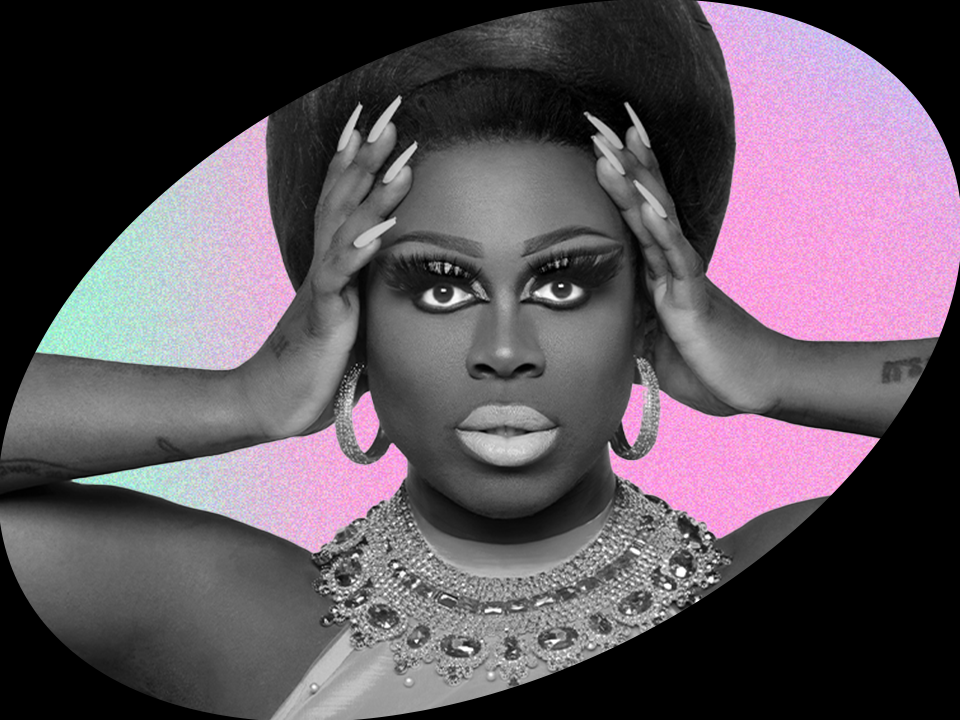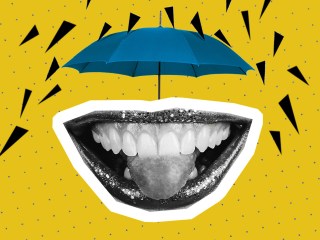Bob the Drag Queen Isn’t on Defense Anymore
The ‘We’re Here’ star and drag icon gives us a glimpse inside his mind right now.
With her fellow drag queens Shangela and Eureka O’Hara, Bob the Drag Queen is back for Season 3 of HBO’s We’re Here and showing everyone why it’s so important to spread love and the power of drag through small towns. Here, Bob (AKA Caldwell Tidicue) talks to Wondermind about what We’re Here reminded him about mental health, the state of his mental health as a teenager, and why gathering in public with his community feels so good right now.
[Sign up here to never miss these candid conversations delivered straight to your inbox.]
WM: How does it feel to have another season of We're Here?
Bob the Drag Queen: You know, We're Here is a really intense show to film. I mean, each episode is like 10 days, and you're in these towns, and it's really emotional. But it still feels really rewarding more than anything. It's just so nice to see these stories that we [filmed] months ago—it feels like years ago. I also just love that these voices are being uplifted.
WM: How do you care for your mental health when filming?
BTDG: They offer us counseling, although I've never actually taken it. I probably should. I call my friends, check in with my partner, and [speak with] my coworkers because we're all out there together. Luckily, we have someone that we can connect to. [I] also keep my eye on why we're doing it, the reason why we're telling these stories, and how important it is.
WM: Have you learned anything about mental health through filming or working with your fellow queens and drag kids?
BTDG: I feel like when you do a project or a show, the correct answer is “I've learned, and I'm a different person.” [Laughs] But I knew a lot of this stuff before I went in. I knew how important mental health is, and I knew how hard the work is, and I knew how hard it can be for queer people in small towns 'cause I am a queer person from a small town.
I wasn't completely naive going in. [But] I've certainly been reminded how hard it is—not just to be a queer person in a small town, but also [how hard it can be for the] family and children of queer people to see your family members go through this. In our Utah episode, one of my drag kids is an adult, and they have a child. To see how it affects the child when you're a trans, non-binary person, and you have to switch schools because people keep making fun of you for having a queer family. I feel like people don't actually think about that and how that affects more than just the person you're heckling or trying to shut down with your lobbying and laws. It affects families. A lot of times these conservatives act like it's all about the children, but is it? Is it?
WM: Right, because what they’re doing isn't helping the kids in these families. The show also helps people feel more confident with themselves and their place in the world. What are you feeling confident and secure about these days?
BTDG: You know, I have been performing drag and standup for maybe 14 years now, which I guess is a long time. … I've been touring a lot and doing my standup in a lot of these small towns lately, and it's been feeling really nice.
There was a real point where I was afraid—and still am a little bit today—to be in public between the pandemic and these terrorist attacks in our queer spaces. It can kind of scare you into not wanting to leave the home. It feels really scary. But we've been gathering, we've been laughing, we've been crying, we've been having a good time out in public, and it feels like we're not supposed to do that.
WM: What stands out to you in your mental health journey?
BTDG: I often think about before I came out of the closet when I was 17—I was pretty young. I mean, not as young as these kids today [laughs]. But when I was in high school, I remember my game plan was just to fake being straight until I died. That was literally my plan, like, Well, I can't ever tell anyone, so I'll just fake it. Maybe I won't marry anyone. Maybe I won't divulge anything. I'll just be a secretive, sad person until I die. I guess if I die young, I won't have to wait that long.
That was such a sad place to be because there are a lot of people who still feel that way today because not everyone comes from a place where they feel they can come out. You know, there are people who are in countries where it's literally illegal to be queer, and that's their game plan: Just pretend to be straight till you die. That's so sad.
WM: What did it feel like when you were starting to broach the idea of coming out? How did your mindset begin to shift?
BTDG: Well, it was terrifying. It started with defiance. It started with me [thinking] I had to run out of the closet and be like, “F*ck you if you don't agree” before anyone even had the chance to say, “Hey, I support you.” It was just me coming out being like, “F*ck all of you. That's the whole story. What of it?”
I remember the first time I ever told anyone I was gay how aggressive I was about it. I was sharing a room with this coworker in Minneapolis, Minnesota, and I was like, I'm meeting a new person. He doesn't know me. I'm going to tell him I'm gay. We were emailing back and forth, and he said, “Just so you know, I'm legally blind. I don't know if there's anything you need to tell me about yourself.” I wrote back and said, “Well, I'm gay, and if you have any problems with that, you don't need to move here” or something. He was like, “I don't have any problems. I think we'll be fine.” [Laughs] But I felt like that was how I had to come out. I had to be middle fingers up, guns blazing.
WM: Do you remember when that started to soften?
BTDG: When I moved to New York City, I was surrounded by lots of queer people, and I didn't feel the need to fight. I didn't feel the need to defend myself 'cause I was surrounded by people who thought like me.
WM: With New Year's here, are you working on any mental health resolutions or are you not into resolutions?
BTDG: Baby, we all do resolutions. Whether you say it or not, we all have our little silent resolution.
WM: Once I drop it, then I start acting like I don't believe in resolutions.
BTDG: Exactly. You're like, I'm not going to tell anyone. I have a friend who quit smoking. He's like, “I'm not going to tell anyone I quit smoking. That way when I pick it up again, no one knows that I failed.”
We all have thoughts about our bodies, and I was thinking to myself, I could either do the physical work it takes to change the things I don't like about my body, or I could do the mental work that it takes to accept those things about my body. I've decided to do neither one of those things [laughs]. The mental work is a lot harder than the physical.
WM: Are you just going with the flow or are you going to work through that in therapy or with other tools that you have?
BTDG: Well, I'm not going to tell you 'cause then I have to do it once it's in print. Oh my god, I’d have to do it forever. I mean, I am in therapy, which is great. [It’s] really, really wonderful. It’s the first time I’ve ever started therapy. I'm 36, and in the Black community—especially southern Black people—we don't really talk about therapy as much as we should. So I'm really happy that I'm actually in these streets getting the help that I need.
WM: What’s something you've improved about your mental health over the years?
BTDG: I'm a lot better at asking for help. I'm a lot better at not being ashamed of having people help me. I never thought I'd actually be good at that.
You know, Cardi B has a lyric in her song “Get Up 10,” and it says, “I waited my whole life just to shit on n*ggas // Climbed to the top floor, so I can spit on n*ggas.” That is a really fierce lyric, but what a spiteful way to live. I used to be like that, like my success wasn't for me; it was at other people. I've gotten to a place now where my success isn't really at anyone. That has not been my always. I am much better at not winning out of spite, but winning because it's just my actual goal.
WM: If you were to talk to yourself like a friend, what would you say?
BTDG: If I'm being really honest and allowing myself to get a little more vulnerable than I would care to, I would tell myself, “You don't always have to defend yourself. It's not always about who's right. Sometimes it's just about what's right.”
This interview has been edited and condensed for length and clarity.
Wondermind does not provide medical advice, diagnosis, or treatment. Any information published on this website or by this brand is not intended as a replacement for medical advice. Always consult a qualified health or mental health professional with any questions or concerns about your mental health.




